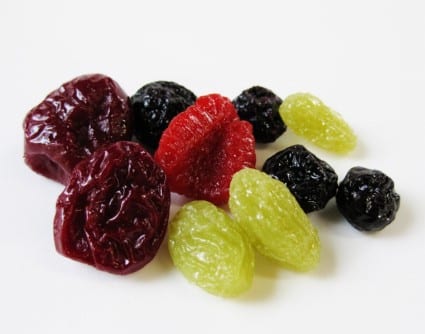We are all being encouraged to eat and drink less sugar, something that I completely agree with. However I’m finding that people are getting increasingly confused with what foods contain sugar and which don’t. The recent WHO and SACN recommendations are that we limit free sugars to 5%.
Dried fruit is often seen as less healthy than fresh fruit due to the sugar content. Let’s put this into context. One dried apricot = 1 fresh apricot with the water removed. So they both contain the same amount of sugar per portion. It is the portion control that is the key here. It is all too easy to munch your way through half a bag of dried fruit, which will be a lot of sugar! Dried fruit also contains fibre, potassium, iron and antioxidants. For some of my eating disorder clients it can be an important source of healthy calories too, so I actually encourage it in their meal plans.
When eating dried fruit think about how much of it you would eat if it was rehydrated:
3 dried apricots
3 prunes
1 tbsp raisin or cranberries
2 figs
Portion it out and add it with something else like some nuts or with cereal.
The other thing to watch is whether anything is added to your dried fruit. Read the labels. Sometime sugar is added in, which seems a little crazy, adding sugar to an already sweet food!
A recent study on prunes showed that they can contribute to weight loss. 100 overweight and obese people were randomised to have either a healthy snack or 140g (female) 170g (male) prunes as a snack each day for 12 weeks. The prunes groups lost around 2kg and 2.5cm waist circumference and were fuller than those on the healthy snacks. So dried fruit is definitely a good thing to be eating in small amounts.
The take home message? Yes dried fruit contains sugar but eaten in small quantities it is fine.
References:
Harrold J, Hughes G, Boyland E, Williams N, McGill R, Blundell J, Finlayson G, Higgs J, Harland J, Halford J. (2014) Dried fruit (prune) consumption does not undermine active weight management or produce adverse gastrointestinal effects. HTPO.017 http://eco2014.easo.org/wp-content/uploads/sites/7/2014/05/BOOK-OF-HT-ABSTRACT-POSTER.pdf
